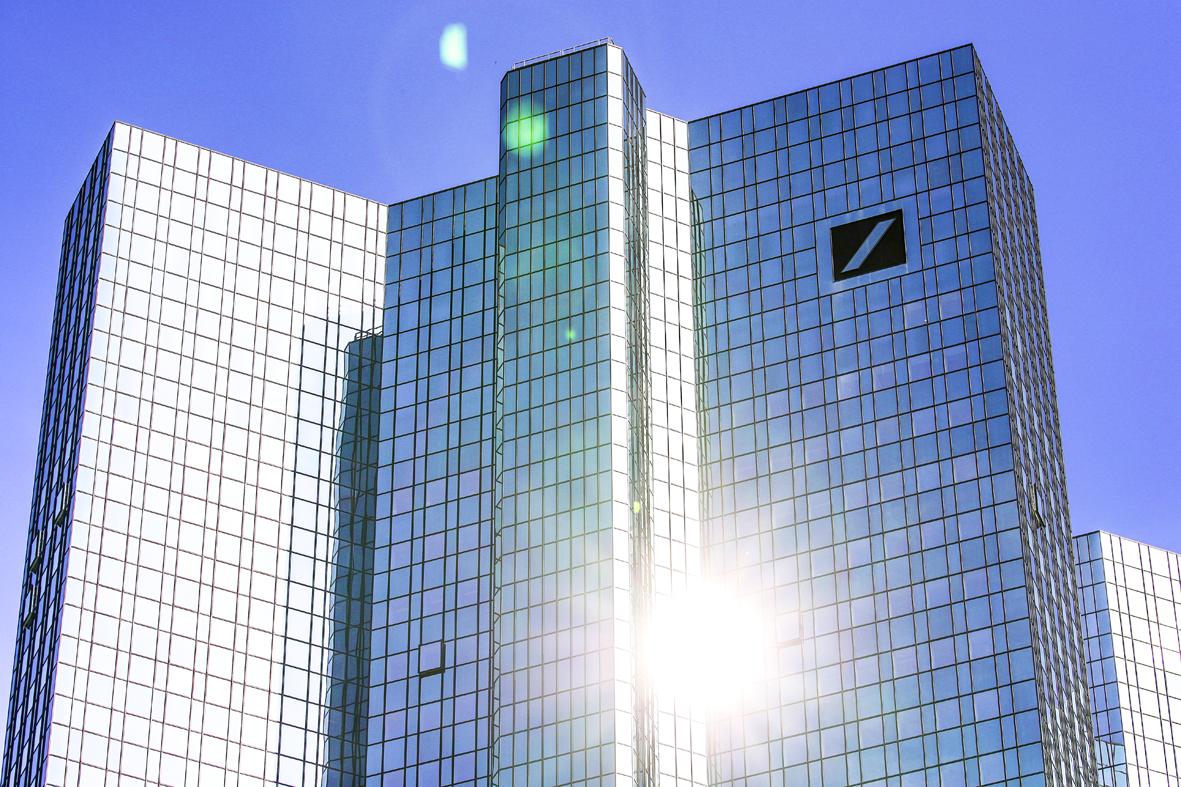Deutsche Bank AG’s new Asia chief executive officer for Asia-Pacific is to be based in Singapore, picking the city-state over Hong Kong at a volatile time for the Chinese territory.
Alexander von zur Muehlen is relocating from Frankfurt, Germany, when he takes over the job at the start of next month, a bank spokeswoman said.
His predecessor, Hong Kong-based Werner Steinmueller, is retiring at the end of this month.

Photo: EPA-EFE
Kamran Khan, the bank’s new head of environmental, social and governance for the region, would also be based in Singapore, moving from the US.
The decision comes as Hong Kong is embroiled in unprecedented political turbulence after more than a year of anti-government protests and now in the cross-hairs of a broader fight between the US and China.
In an intense rivalry with Singapore, Hong Kong has long been a hub for Asian finance, with nearly all of the major global banks, including Goldman Sachs Group Inc, JPMorgan Chase & Co and Citigroup Inc, having their top regional executive in the territory.
This would be the first time in at least a decade for the German bank to put its sole Asia CEO outside of Hong Kong.
China last month passed a National Security Law to rein in criticism of its rule in the territory, raising concerns its “one country, two systems” framework devised to maintain its freedom of expression, capitalist financial system and independent judiciary would be undermined.
Granted, Deutsche Bank has had placed its co-CEO for the region in Singapore. From 2012 to 2016, the Asian business was run by co-CEOs Alan Cloete and Gunit Chadha, who worked out of Hong Kong and Singapore respectively. The two were replaced by Steinmueller in 2016, the first management board member to be based in the fast-growing region, according to the press release.
“We remain committed to our dual-hub structure in Asia Pacific,” a Hong Kong-based spokeswoman said.
Singapore has been one of the major hubs for the bank’s commercial banking and fixed income services, while its wealth management, corporate finance and asset management are predominately staffed out of Hong Kong. The bank is exiting its equities sales and trading operations globally.
Deutsche Bank posted losses of 100 million euros (US$114.1 million) in Hong Kong last year, where it had 1,035 employees.
In Singapore, where it had 1,921 full-time staff, the bank posted a profit of 102 million euros, according to its annual report.
Combined credit exposure in China and Hong Kong amounted to 13.6 billion euros, compared with 7.5 billion euros in Singapore.
Helman Sitohang at Credit Suisse Group and UBS AG’s Edmund Koh are the only Asia heads based in Singapore among global banks.
Barclays PLC Asia head Jaideep Khanna is operating out of India.
Morgan Stanley’s co-Asia CEOs, Gokul Laroia and Wei Christianson, work out of Hong Kong and Beijing respectively.

SELL-OFF: Investors expect tariff-driven volatility as the local boarse reopens today, while analysts say government support and solid fundamentals would steady sentiment Local investors are bracing for a sharp market downturn today as the nation’s financial markets resume trading following a two-day closure for national holidays before the weekend, with sentiment rattled by US President Donald Trump’s sweeping tariff announcement. Trump’s unveiling of new “reciprocal tariffs” on Wednesday triggered a sell-off in global markets, with the FTSE Taiwan Index Futures — a benchmark for Taiwanese equities traded in Singapore — tumbling 9.2 percent over the past two sessions. Meanwhile, the American depositary receipts (ADRs) of Taiwan Semiconductor Manufacturing Co (TSMC, 台積電), the most heavily weighted stock on the TAIEX, plunged 13.8 percent in

A wave of stop-loss selling and panic selling hit Taiwan's stock market at its opening today, with the weighted index plunging 2,086 points — a drop of more than 9.7 percent — marking the largest intraday point and percentage loss on record. The index bottomed out at 19,212.02, while futures were locked limit-down, with more than 1,000 stocks hitting their daily drop limit. Three heavyweight stocks — Taiwan Semiconductor Manufacturing Co (TSMC, 台積電), Hon Hai Precision Industry Co (Foxconn, 鴻海精密) and MediaTek (聯發科) — hit their limit-down prices as soon as the market opened, falling to NT$848 (US$25.54), NT$138.5 and NT$1,295 respectively. TSMC's

In a small town in Paraguay, a showdown is brewing between traditional producers of yerba mate, a bitter herbal tea popular across South America, and miners of a shinier treasure: gold. A rush for the precious metal is pitting mate growers and indigenous groups against the expanding operations of small-scale miners who, until recently, were their neighbors, not nemeses. “They [the miners] have destroyed everything... The canals, springs, swamps,” said Vidal Britez, president of the Yerba Mate Producers’ Association of the town of Paso Yobai, about 210km east of capital Asuncion. “You can see the pollution from the dead fish.

ASML Holding NV, the sole producer of the most advanced machines used in semiconductor manufacturing, said geopolitical tensions are harming innovation a day after US President Donald Trump levied massive tariffs that promise to disrupt trade flows across the entire world. “Our industry has been built basically on the ability of people to work together, to innovate together,” ASML chief executive officer Christophe Fouquet said in a recorded message at a Thursday industry event in the Netherlands. Export controls and increasing geopolitical tensions challenge that collaboration, he said, without specifically addressing the new US tariffs. Tech executives in the EU, which is